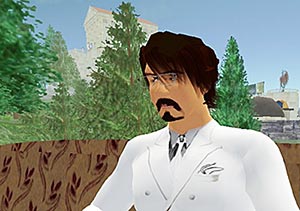| Second Life Page |
More Happiness in Second Life than in Real Life? |
 |
 |
| 08 January 2013 | ||||
We're not ready for an Era where people prefer Virtual Experiences to Real Ones. But that Era seems to be here
An academic study co-authored last year by leading virtual world academic Edward Castronova suggests that people get more happiness from being in Second Life than they do from good news in their real life. In other words, as he wrote on his blog, "Second Life is providing a big chunk of life satisfaction, just as big as the factors that previous researchers on life satisfaction have found were the 'biggies,' like health, employment, and family relationships." I deeply suspect this is also true for people who extensively play other immersive virtual worlds and MMOs with similar features. Which would mean that for tens of millions of people, this famous scene from The Matrix, in which a man betrays his real life friends for the chance at having a better virtual life, is relevant to their actual choices. Of course, I think few MMO/virtual world players would make as stark and serious a choice as Cypher did, but at the same time, we are already well acquainted with many who do sacrifice aspects of their real life for their virtual one -- jobs and chores skipped, friends and loved ones ignored, so some of us could spend just a little more time socializing or gaming in a 3D digital landscape that doesn't strictly exist. This also calls the mind the "experience machine" thought experiment put forth by philosopher Robert Nozick, way back in the 70s. Nozick asks us to imagine a machine that could give us whatever desirable or pleasurable experiences we could want. Psychologists have figured out a way to stimulate a person's brain to induce pleasurable experiences that the subject could not distinguish from those he would have apart from the machine. He then asks, if given the choice, would we prefer the machine to real life?
Nozick argued that of course people would reject the Experience Machine, and prefer pleasures that were real. Now, however, that question for many people is very much in doubt. And I believe we have not culturally or socially processed this reality very well. However, to me the good news is that we're moving towards an era where virtual versus real is a false dilemma. Even with Second Life, we saw that with the implementation of a real world IP rights policy for user-generated content, and the ability to convert real money into virtual currency and vice versa. It's another reason why I'm a big fan of social media integration, so people can convey their virtual experiences into wider networks of people beyond the immersive context, and help form and sustain offline communities that begin virtually. Same goes with virtual experiences that are shareable with others, especially those close to us: For instance, the iPad and the Kinect, which are ideal for group experiences. But these are technical solutions, and as great as they are, we haven't quite had a larger discussion around the implications of a culture where virtual as such has about as much weight as reality as such -- if not more. But I definitely think the conversation needs to start soon: As Professor Castronova has forcefully argued as well, the virtual economy also seems to be contributing to our real world recession. |
 -->
-->














